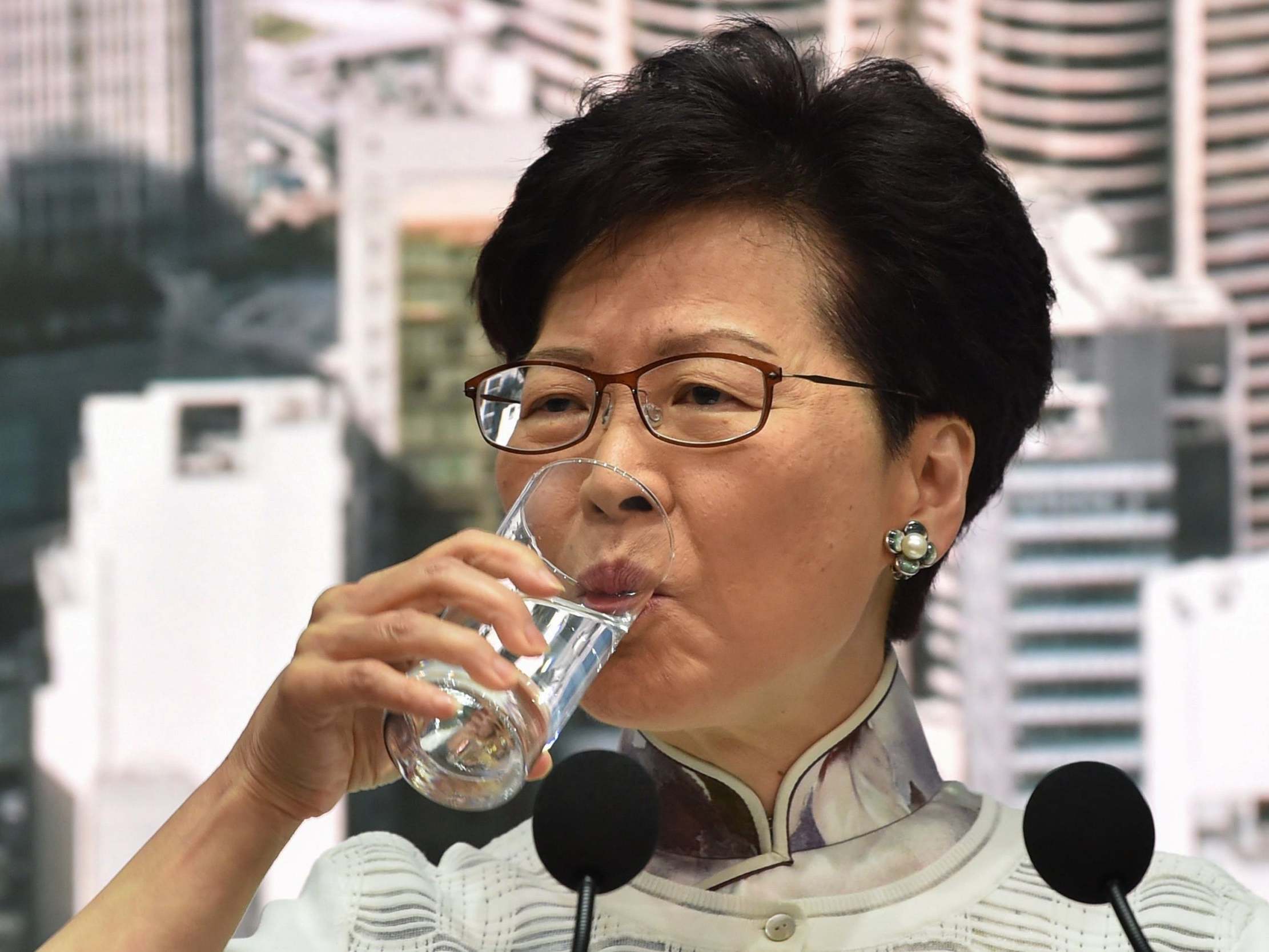Hong Kong leader Carrie Lam suspends controversial China extradition bill after mass protests and violence
Chief executive says city’s legislature will stop all work on unpopular bill

Your support helps us to tell the story
From reproductive rights to climate change to Big Tech, The Independent is on the ground when the story is developing. Whether it's investigating the financials of Elon Musk's pro-Trump PAC or producing our latest documentary, 'The A Word', which shines a light on the American women fighting for reproductive rights, we know how important it is to parse out the facts from the messaging.
At such a critical moment in US history, we need reporters on the ground. Your donation allows us to keep sending journalists to speak to both sides of the story.
The Independent is trusted by Americans across the entire political spectrum. And unlike many other quality news outlets, we choose not to lock Americans out of our reporting and analysis with paywalls. We believe quality journalism should be available to everyone, paid for by those who can afford it.
Your support makes all the difference.Hong Kong’s chief executive Carrie Lam has indefinitely postponed a proposed law allowing extraditions to mainland China that sparked widespread protests on the island.
The unpopular bill would be suspended, she told a press conference on Saturday, adding that she wanted to restore public order following a week of violent demonstrations.
Critics of the extradition bill, which covers Hong Kong’s seven million residents, foreign and Chinese nationals living or travelling in the city, claimed it threatened the rule of law that underpins Hong Kong’s international status.
Around 1 million people, according to protest organisers, marched through Hong Kong to oppose the bill earlier this week. Protests that continued over recent days were met with tear gas and rubber bullets from police, piling heavy pressure on Ms Lam to change course.
Ms Lam said the city’s legislature would stop all work on the bill and next steps would be decided after consultation. The embattled leader said the government would keep “an open mind” and she would “adopt a sincere and humble attitude in accepting criticism” over her handling of the issue.
Government support for the extradition bill began to waver on Friday with several pro-Beijing politicians and a senior advisor to Ms Lam saying discussion of the bill should be shelved for the time being.
The territory’s chief executive had claimed the extradition law was necessary to prevent criminals using Hong Kong as a place to hide and that human rights would still be protected by the city’s court, which will decide on the extraditions on a case-by-case basis.
Backing down from efforts to drive the bill through the city’s legislature appeared unthinkable only last week as Ms Lam remained defiant about the law’s passage.

Beyond the public outcry, the extradition bill had spooked some of Hong Kong’s tycoons into starting to move their personal wealth offshore, according to financial advisers, bankers and lawyers in the city.
Senior police officers also said Ms Lam’s refusal to heed public opinion was sowing resentment in the force, which was already battered by accusations of police brutality during the 2014 Umbrella Movement protests.
Prior to Ms Lam’s announcement, Michael Tien, a member of Hong Kong’s legislature and a deputy to China’s national parliament, said he supported a suspension of the bill without a timetable but also insisted total withdrawal of the bill was unlikely.
“The amendment is supported by the central government, so I think a withdrawal would send a political message that the central government is wrong. This would not happen under ‘one country, two systems’,” he said, referring to the model under which Hong Kong enjoys a form of autonomy from China.
A leader of the Civil Human Rights Front (CHRF), Jimmy Sham, called on Ms Lam to withdraw the bill entirely and to apologise for the use of potentially deadly force by police in clashes earlier this week. The group said a demonstration planned for Sunday would go ahead.

Critics, including leading lawyers and rights groups, note that China’s justice system is controlled by the Communist Party, and marked by torture and forced confessions, arbitrary detention and poor access to lawyers.
Last Sunday’s protest in the former British colony was the biggest political demonstration since its return to Chinese rule in 1997, when the “one country, two systems” agreement was established to guarantee Hong Kong’s special autonomy – including freedom of assembly, free press and independent judiciary.
Many accuse China of extensive meddling since then, including obstruction of democratic reforms, interference with elections and of being behind the disappearance of five Hong Kong-based booksellers, starting in 2015, who specialised in works critical of Chinese leaders.
Steve Tsang, a London-based political scientist, said Ms Lam had caused President Xi Jinping “major embarrassment” at a time that is not helpful for him given trade tensions with the United States, and ahead of a possible meeting with Donald Trump at the G20 summit in Japan later this month. “Xi is not a leader who tolerates failures of officials,” Mr Tsang said.
China’s Foreign Ministry spokesman Geng Shuang expressed support for Ms Lam, saying that the Chinese government “expresses respect and understanding” for the decision. He said: “Maintaining Hong Kong’s prosperity and stability is not only in China’s interest, but also in the interests of all countries in the world.”
Beijing has denied that it has overreached in Hong Kong.
Additional reporting by Reuters
Join our commenting forum
Join thought-provoking conversations, follow other Independent readers and see their replies
Comments